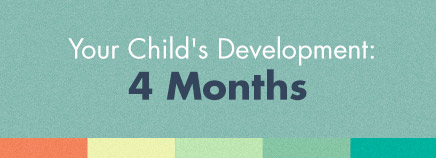
Babies this age are learning how to interact with the world around them. To get your attention, your baby might cry, fuss, or squeal. To get a better view of the room, babies may use newfound strength to pull up on their arms while lying on the belly.
Doctors use certain milestones to tell if a baby is developing as expected. There’s a wide range of what’s considered normal, so some babies gain skills earlier or later than others. Babies who were born prematurely reach milestones later. Always talk with your doctor about your baby’s progress.
Here are some things your baby might be doing:
Communication and Language Skills
- babbles with expression as a way to get your attention
- smiles, laughs, squeals, and blows bubbles
- begins to coo in response to your coos
- stares at your mouth as you speak
- has different cries for hunger, tiredness, or pain
Movement and Physical Development
- rolls from front to back
- begins to reach and grasp for objects
- bring toys to the mouth, often with a two-handed grasp
- has good head control when sitting
- holds up the head and chest, supported by the arms, while on tummy
Social and Emotional Development
- smiles when something pleasing happens, such as a belly tickle, and responds to affection
- initiates social interaction with coos or babbles
- self-soothes, such as sucking on a fist when hungry
- gets excited when a caregiver approaches
Cognitive Skills (Thinking and Learning)
- is easily distracted by surroundings (for example, a baby that used to be focused on nursing or sucking from a bottle is now interrupted by the slightest noise)
- starts to predict routines (for example, stops crying when placed in a nursing position or flexes hips in anticipation of a diaper change)
- repeats behaviors that produce a desired effect, such as batting a toy to move it
- grasps and examines own hands
- explores toys by grasping, mouthing, and looking at them
When to Talk to Your Doctor
As a parent, you are the best observer of your baby. Share your concerns — even little ones — with your baby’s doctor. Always tell the doctor if your baby:
- regularly babbles, but then suddenly stops
- cannot maintain head control when held in a supported position
- doesn’t notice when people enter the room
- doesn’t swipe at nearby toys
- doesn’t respond to voices or other pleasing sounds
Also, if you ever notice that your baby has lost skills he or she once had or shows weakness on one side of the body, tell your doctor.

